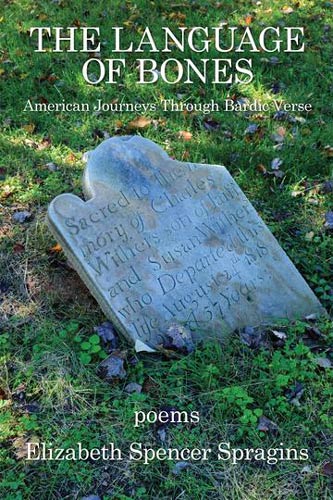‘The Language of Bones’ by Elizabeth Spencer Spragins
 Elizabeth Spencer Spragins’ passion for bardic verse in The Language of the Bones is irresistible. I can’t imagine a writer who, after reading this, wouldn’t try her hand at it or even use this as a class text to inspire students. Though Spragins does not provide ‘guidelines’ for the forms she utilizes – four Welsh (cywydd llosgyrnog, rhupunt, clogyrnach, cyhydedd hir) and one Gaelic (rannaigheacht ghairid) – a Google search offers plenty of resources (including an article by Spragins herself).
Elizabeth Spencer Spragins’ passion for bardic verse in The Language of the Bones is irresistible. I can’t imagine a writer who, after reading this, wouldn’t try her hand at it or even use this as a class text to inspire students. Though Spragins does not provide ‘guidelines’ for the forms she utilizes – four Welsh (cywydd llosgyrnog, rhupunt, clogyrnach, cyhydedd hir) and one Gaelic (rannaigheacht ghairid) – a Google search offers plenty of resources (including an article by Spragins herself).
This “American Journeys in Bardic Verse” takes readers from Virginia to South and North Carolina, the deserts of the Southwest, the forests of the Northwest, and all the way to Alaska. Each poem is accompanied by endnotes to provide historical and cultural contexts. Because Spragins has specifically chosen to give “voice to the unspoken, the overlooked, and the forgotten,” these poems require prior knowledge for greatest appreciation, and each is a kind of history lesson. The “starving time” in colonial Jamestown; the forcible removal of the Cherokee Nation from their homeland; people, events, and landmarks of the American Civil War and the south are subjects Spragins educates her readers about through deftly crafted meter and rhyme which, she instructs, is traditionally read aloud.
Spragins also includes contemporary issues and does not shy away from controversy, as in her poem “At Standing Rock,” commenting on the treatment of Lakota Sioux. “Polar Night,” “Hunters,” and “Northern Lights” stand in witness to the devastations of climate change. And the book closes on a series of poems that return to places where nature and spirituality intersect, in “Sedona,” “The Garden of the Gods,” the Sangre de Cristo Mountains (“Sacred Songs”), and Muir Woods (“Spires”). A looking outward from who and where we are physically to something much greater and beyond.
Read more about Elizabeth Spencer Spragins and The Language of the Bones in an interview with Ceri Shaw on AmeriCymru.
Review by Denise Hill




